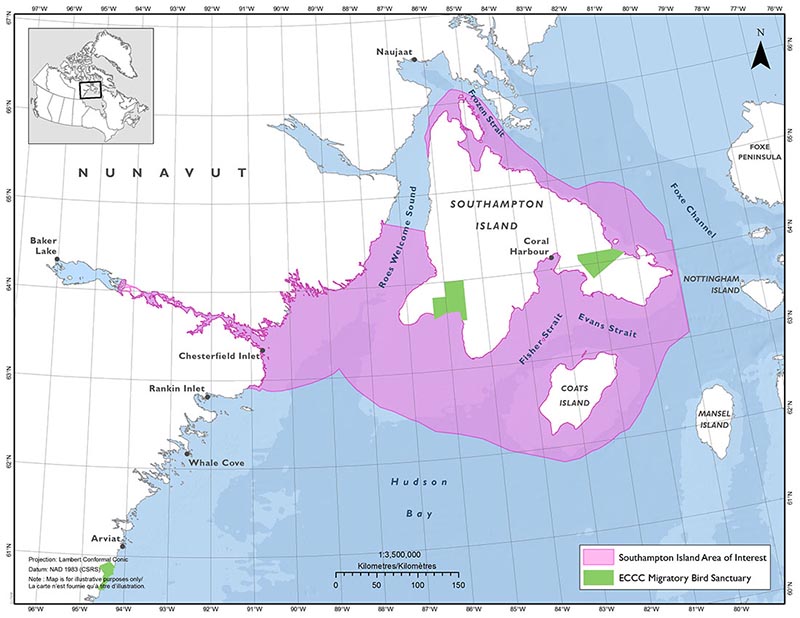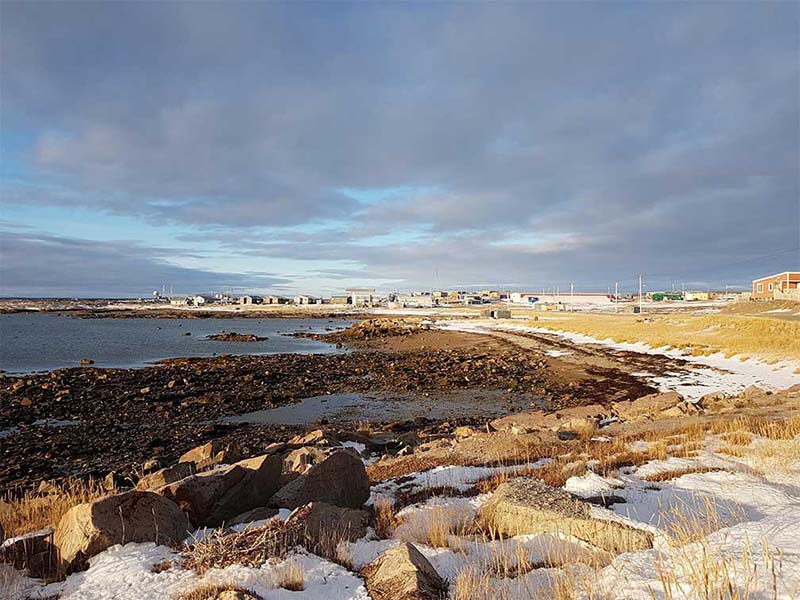Southampton Island Area of Interest (AOI)
At-A-Glance
At-A-Glance
Location
The Southampton Island AOI encompasses the nearshore waters around Southampton Island and Chesterfield Inlet in the Kivalliq Region of Nunavut. This site occurs within the Hudson Bay Complex Marine Bioregion.
Approximate Size (km2)
93,087 km2
Approximate % of Canada's ocean territory
1.6%
Date identified
May, 2019
Proposed Overarching Goal
To conserve and protect the ecological integrity of the area. Goals and conservation objectives are to be further developed with partners and stakeholders.
Environmental Context
Southampton Island is the largest island in Hudson Bay, near the confluence of Hudson Bay and Foxe Basin waters; making it an area of high marine productivity. The area is important for key marine and terrestrial species. It is an important migration pathway for marine mammals (narwhal, beluga whales and bowhead whales), contains walrus haul-out sites, polar bear dens, and habitat for numerous seabird colonies. Marine conservation values within the Area of Interest extend into two Environment and Climate Change Canada (ECCC) Migratory Bird Sanctuaries: The Harry Gibbons (Ikkattuaq) Migratory Bird Sanctuary, and the East Bay (Qaqsauqtuuq) Migratory Bird Sanctuary.
Ecological Importance
Ecological Importance
The Southampton Island AOI captures important portions of three identified Ecologically and Biologically Significant Areas (ESBAs):
- Southampton Island
- Repulse Bay/Frozen Strait
- Western Hudson Bay Coastline
The marine area around Southampton Island provides a migration pathway for marine mammals, important haul-out sites for walrus, as well as denning areas and summer refuge for polar bears. The Eastern Canada-West Greenland bowhead whale population can also be found in the area. The marine area also supports colonies of nesting common eiders and other seabirds. Most of the Southampton Island EBSA is captured in the AOI.
Repulse Bay/Frozen Strait is a summer marine mammal and seabird feeding area. A southern portion of the Repulse Bay/Frozen Strait EBSA is captured in the AOI on the north side of Southampton Island.
The Western Hudson Bay Coastline area is particularly important during the ice-free season for beluga and killer whales, and seabirds. Important Arctic char stocks feed in the area. The northern portion of the Western Hudson Bay Coastline EBSA is captured in the AOI.
Key Objectives and Approach
Key Objectives and Approach
Potential conservation priorities are:
- High naturalness
- Important habitat and haul-out sites for the Central-Low Arctic walrus (COSEWIC Special Concern)
- Important migration pathways for the Eastern Canada-West Greenland bowhead whale (COSEWIC Special Concern) and the Western Hudson Bay beluga whale (COSEWIC Special Concern)
- Important foraging areas for nesting seabirds and marine mammals
The selection of an AOI marks the beginning of the Marine Protected Area establishment process, led by Fisheries and Oceans Canada. An important first step in designating a Marine Protected Area is to initiate consultation mechanisms, including the establishment of an advisory committee, to engage with Indigenous peoples, other government partners, and stakeholders including industry and local communities. The process includes the collection and consideration of ecological and socio-economic information including Indigenous knowledge. A risk assessment is also completed. The information gathered through consultation, data collection and analysis will inform the area's conservation objectives, along with its boundary and zones, and will help determine the management measures and associated regulations required for the future Marine Protected Area.
For more information about the Southampton Island MPA establishment process, please contact:
Fisheries and Oceans CanadaIqaluit District Office
630 Mivvik Street
Iqaluit, Nunavut X0A 0H0
Canada
P.O. Box 358
Telephone: 867-979-8000
Fax: 867-979-8039
Email: DFO.OceansCentralArctic-OceansCentralArctique.MPO@dfo-mpo.gc.ca
Research and Publications
Research and Publications
- Identification of Ecologically and Biologically Significant Areas (EBSA) in the Canadian Arctic (2011) (CSAS ResDocs - 2011/070)
- Proceedings 2020/014 – Proceedings of the Regional Science Peer Review on the Biophysical and Ecological Overview of the Southampton Island Ecologically and Biologically Significant Area; December 5-6, 2018
- Research Document 2020/032 – Ecological and Biophysical Overview of the Southampton proposed Area of Interest for the Southampton Island Ecologically and Biologically Significant Area
- Science Advisory Report 2020/057 – Identification of Ecological Significance, Potential Conservation Objectives, Knowledge Gaps and Vulnerabilities for the Southampton Island Ecologically and Biologically Significant Area
- Science Response 2020/055 – Supplement to the Biophysical and Ecological Overview for the Southampton Island (SI) EBSA to include Addition Areas within the Southampton Island Area of Interest (AOI)
- Date modified:

